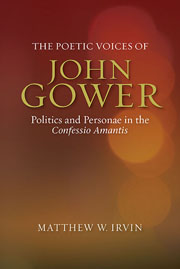Book contents
- Frontmatter
- Contents
- Dedication
- Acknowledgements
- List of Abbreviations
- Introduction: Making and Doing Love
- 1 The Inheritance of the Confessio Amantis
- 2 The Orientation of the Prologue to the Confessio Amantis
- 3 Amorous Persons
- 4 Pity and the Feminine
- 5 Labor and Art
- 6 Alienation and Value
- 7 The Love of Kings
- Conclusion: Identifying Amans
- Bibliography
- Index
- VOLUMES ALREADY PUBLISHED
Conclusion: Identifying Amans
Published online by Cambridge University Press: 05 March 2014
- Frontmatter
- Contents
- Dedication
- Acknowledgements
- List of Abbreviations
- Introduction: Making and Doing Love
- 1 The Inheritance of the Confessio Amantis
- 2 The Orientation of the Prologue to the Confessio Amantis
- 3 Amorous Persons
- 4 Pity and the Feminine
- 5 Labor and Art
- 6 Alienation and Value
- 7 The Love of Kings
- Conclusion: Identifying Amans
- Bibliography
- Index
- VOLUMES ALREADY PUBLISHED
Summary
The education and experience that produces the coherent prudence and the artful pleasure of the “Tale of Apollonius” does not produce the same result for Amans. Genius' educational project has provided Amans with example after example, but Amans' alienated power of choice has made true experience impossible. From each example he takes the same lesson: he might yet get his desire, the gods of love might still grant him grace, Genius might yet give him the key to the art of love. Therefore, at the end of the “Tale of Apollonius” when Amans and Genius express that they have “herd and understonde” (VIII.2030, 2066) each other, they are only partially right. Genius has explained to Amans:
…I wolde rede
To lete al other love aweie,
Bot if it be thurgh such a weie
As love and reson wolde acorde.
For elles, if that thou descorde,
And take lust as doth a beste,
Thi love mai noght be honeste,
For be no skile I finde
Such lust is noght of loves kinde.
(VIII.2020–8)Sure enough, Amans has no interest in loving “as doth a beste”; he is no Tereus or Antiochus, and the “honeste” love of Apollonius constitutes a pleasure that he would certainly enjoy. Yet while “hearing” the words Genius has said, Amans understands them according to his own notion of social relations and prudence, based as they are entirely on fiction: “mede arist of the servise;/ Fortune, thogh sche be noght stable,/ Yit at some time is favorable/ To hem that ben of love trewe” (VIII.2012–15).
- Type
- Chapter
- Information
- The Poetic Voices of John GowerPolitics and Personae in the Confessio Amantis, pp. 277 - 288Publisher: Boydell & BrewerPrint publication year: 2014



